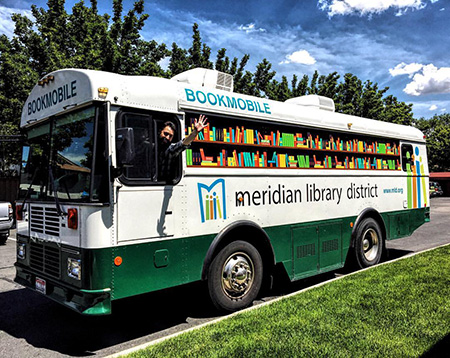Blog Posts | May 29, 2020
Share ThisWi-Fi on Wheels: How—and Why—Libraries are Bringing Their Services Into Communities

Bookmobiles have long been a part of the American story, bringing library materials to patrons in remote and rural areas. But now, there’s a creative new use for these vehicles: roaming hot spots, coming to a neighborhood near you.
These days, having internet access is as important as electricity and other utilities. Approximately 19 million Americans—6 percent of the population—still lack access to high-speed broadband service. In rural areas, which are home to nearly one-fourth of the nation’s population, the gap is even bigger: an estimated 14.5 million people lack access to this critical service.
It’s an issue that hasn’t gone unnoticed. In addition to IMLS state grants through the Library Services and Technology Act (LSTA) and the more recent CARES Act funding, U.S. libraries receive support through the FCC’s E-Rate program to help them obtain and deliver broadband access to their communities. These efforts seek to respond to the critical need for broadband—an issue brought into even sharper focus by COVID-19.
Across the country, libraries have been taking action. In Arizona, one of the first states to announce subgrants from IMLS CARES Act funding, the Buckeye Libraries are adding additional hotspots in their buildings which people can access from outside. And when it comes to digital services, these libraries have seen e-book checkouts increase 65 percent compared to the same time last year.
In Georgia, Forsyth County Public Libraries are adding Wi-Fi amplifiers so that people without internet access at home can drive to their library parking lot and use the library’s connection for free.
This snazzy new #bookmobile will soon hit the road in Calhoun County. Special thanks to @US_IMLS for providing #LSTA grant money to help make outreach possible. pic.twitter.com/6zKsWRvr8i
— SC State Library (@scstatelibrary) May 28, 2020
Other libraries, like Virginia’s Williamsburg Regional Library, are repurposing bookmobiles as Wi-Fi hotspots, parking them in convenient locations around their communities and moving them each day to accommodate a different neighborhood. People who need to connect can still maintain social distancing guidelines while using the hotspots since they never have to leave their cars.
So far, the added coverage has been a significant boost in many underserved communities. Since mid-March, the Cuyahoga County Public Library in Ohio has counted nearly 30,000 network sessions on its Wi-Fi accessed via its parking lot.
Bookmobiles are still being used for their original purposes as well. Residents of Calhoun County in South Carolina will have easier access to their public library through a new bookmobile, equipped with features for improved accessibility, which arrived on May 21. The bookmobile’s routes will include new locations where patrons currently have limited access to the library. The project is possible thanks to an LSTA grant from IMLS, administered by the South Carolina State Library.
These are just a few examples as libraries across the country are being required to pivot and respond to extraordinary change in the face of staff layoffs, funding cuts, and health concerns during the ongoing pandemic. To help support communities, applications for IMLS CARES Act grants are being accepted through June 12.
Do you have a story to share about your library? Let us know at imlsnews@imls.gov.
Photo courtesy of Meridian Library District.
